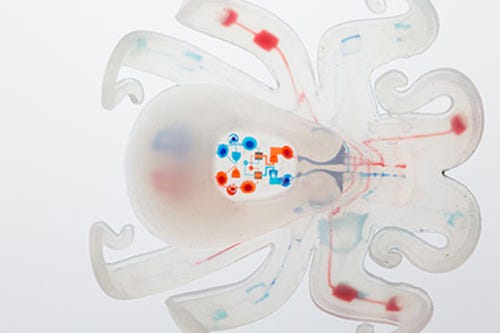September 14, 2016
3-D printing enabled Harvard researchers to create the "octobot," an octopus-inspired robot that is entirely made of soft materials and powered by chemical reactions controlled by microfluidics.
"In fields where a gentle touch is more important than a rigid grasp, we believe soft robots will emerge as the winner. Soft robotic grippers are already being used to handle undersea structures in scientific research. One can easily envision soft robots being used to handle fragile objects such as crops, or even living beings. Internal medicine and wearable devices are also likely areas for future soft robots," Michael Wehner, postdoctoral fellow at Harvard's Wyss Institute and co-first author on the work, recently told Qmed.
Continue >>
[Image courtesy of Harvard University's Wyss Institute]
About the Author(s)
You May Also Like





